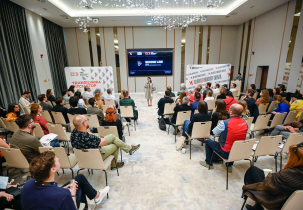
Cristi Mărculescu: Would you have chosen other films to represent you in the 3x3 section? I ask because two of the films (Nenette and La Maison de la radio) are very recent. In Être et avoir and La Maison de la Radio we are dealing with microcosms, societies in miniature. Nenette, however, is very different.
Nicolas Philibert: I am happy with the choices, I even participated in their selection with Mihai Chirilov. We met at the documentary festival at Salonic and we agreed upon them.
How do you go about choosing a film subject? Personal curiosity, followed by a more scientific study?
It is not at all a question of scientific study, I don’t do such a thing. They are personal choices, something both intuitive and driven by the desire to do something new with each film. I do not want to repeat myself. I seek different venues and perspectives.
Has it ever happened to you that you would abandon a subject?
No. Generally, when I choose a film subject, I do not give up half-way. The choice of subjects for my films is connected to meetings, events and circumstances from my life. For example, Être et avoir happened because I had been invited some years prior to one of those schools in the countryside. After that, I returned to one, a week at a time, over a period of six months. I had a total of ten weeks actually spent at that school, and then I started editing. For Nenette I filmed precisely ten days.
A fairly radical film, Nenette, with the dissociated sound and image.
Yes, it is somewhat radical. The stake is this disjunction between sound and image, their complete disjunction. We see Nenette but as for hearing, we hear the people speaking. For me, cinema is built upon the tension between what we see and what we do not. What is being formulated and what is not. The visible versus the invisible. Cinema mustn’t show everything. Some things beg inclusion, while others must be left up to the spectator’s imagination. Cinema feeds our imagination, by omitting some elements from its speech.
The documentary genre is generally perceived as a source of pre-made, pre-digested information. For the average viewer, your films can be quite a challenge.
Yes, people associate documentary with reporting. For many, it is an objective view of a subject, fact which is completely false. A documentary is a subjective point of view. A documentary is not reality. If you place five filmmakers in the same reality, they will film five different films. Contrary to what we have been repeatedly told for decades, a documentary is not objective. It is not a Xerox copy of a reality. It is a lecture or a rereading of some events of the real.
In the last decade, the documentary genre has started to show that it can be a different type of fiction, that it differs from reporting, and this kept happening with films highly successful with critics and audiences alike. Fahrenheit 9/11, or, more recently, The Act of Killing, have changed the perception of documentary and, more precisely, its limits. Is this a good moment for the genre and for documentary filmmakers?
Slowly audiences are beginning to understand that documentary is not merely a venue of journalism but a self-standing form of cinema, one that has a wide variety of styles, writings, motives and scopes. Today there exist in documentary as many styles as there are in fiction. I make no comparisons between documentary and fiction. I consider documentary to be a different way of making fiction. From the very moment that you place your camera somewhere, you have begun interpreting the real. In editing, if you decide to put one shot after another, what you are doing is called interpretation, therefore fiction. Another type of fiction, one that differs than the one with actors.
If I understand correctly, you are for the third time in Romania. The first time, you came to Bucharest before the revolution. How do you see now, from the outside, a country that you have seen in its darkest hours?
The first time I came to Bucharest was in 1987. I had been invited by the French Institute to present a film within a film festival with mountains and mountain-climbing. I was there for a few days and I was profoundly shocked. The stores were empty, people were waiting in lines for food. There was no heating. At the film screening, the room was packed to the brim. There was a hunger, and I don’t know if it was a hunger for culture or for mountain-climbing films. It was simply escapism. After the screening, many of the people in the audience asked me to meet with them. And they all wanted to meet in a park. I understood that it was because of the fear. The fear of being listened in on, to be intercepted, seen and exposed. I was happy to be able to help one of them to leave Romania. He was a young mountain-climber and I arranged for him to be invited to one of these festivals with mountain films in France, where he managed to stay until after the revolution. The second time was in 2007-2008 and I stayed for less than a day. A distributor was releasing one of my films and invited me. Now I’m staying for three days in Cluj…
Interview by Cristi Mărculescu (AperiTIFF)





